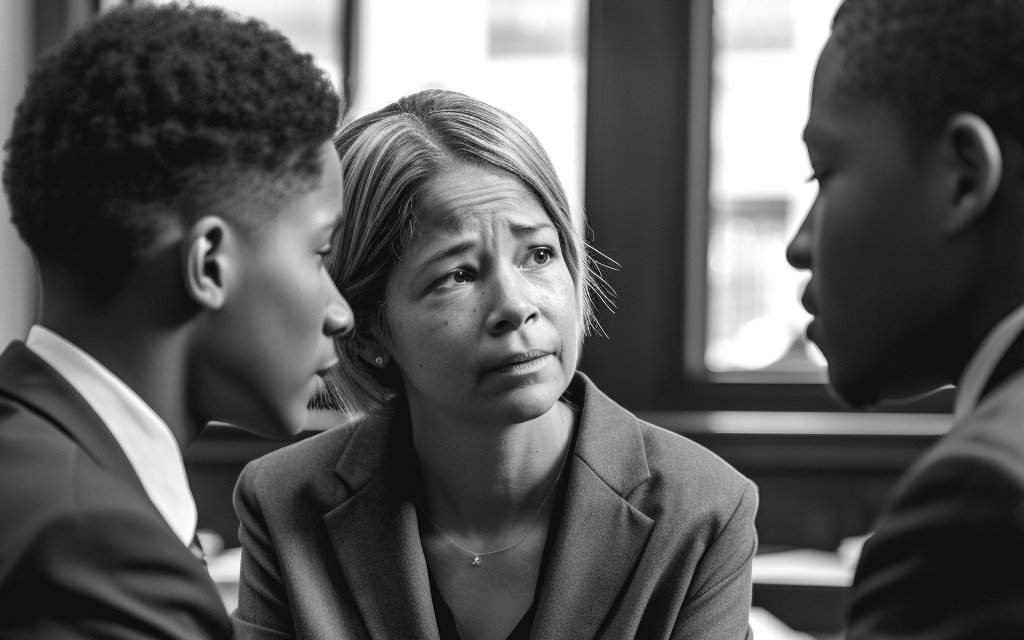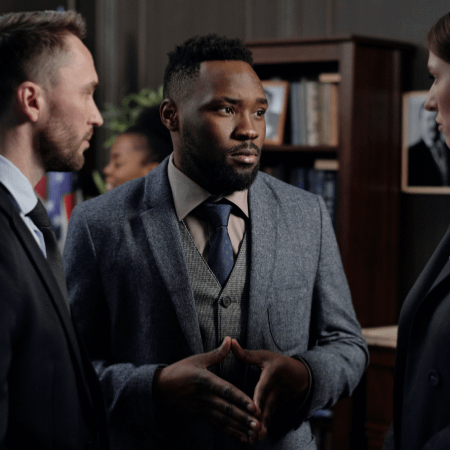Sexual abuse survivors often face a long and difficult battle. For a survivor of such a heinous crime, it can often be overwhelming to navigate the legal system and seek justice.
If you or a loved one is a survivor of sexual abuse, know that there are legal resources available. Justice for abuse survivors is possible. Together, we can hold the perpetrator and any other enabling third parties accountable for their actions. There are compassionate individuals and organizations who are available to support you on your journey toward healing, including the trusted lawyers here at StrongerThan.org.
What is Sexual Abuse?
Sexual abuse occurs when any sexual activity is imposed on an individual without their consent. It involves the violation of a person’s boundaries and the exploitation of their trust and vulnerability. Sexual abuse can take many different forms, and affect people of all ages, genders, ethnicities, and sexual orientation.
Examples of sexual abuse include unwanted touching, fondling, or forced sexual acts. It can occur in various settings, such as a school, workplace, or religious institution. Sexual abuse has long-lasting and profound effects on survivors, impacting their physical, emotional, and mental well-being.
Sexual Abuse vs. Sexual Assault
Although sexual abuse and sexual assault are often used interchangeably, they refer to different types of unwanted sexual acts. Sexual abuse refers to any form of nonconsensual sexual activity, whether or not physical. What sets sexual abuse apart from other forms of sexual misconduct is the power dynamics involved, as it often occurs in relationships where one person holds power or authority over the other. This power imbalance makes it difficult for survivors to come forward or seek help, as they may fear certain repercussions or feel that they would not be believed.
On the other hand, sexual assault specifically refers to non-consensual sexual contact which may range from threat of sexual contact to rape. Sexual assault can occur in various contexts, including stranger assaults, date rape or acquaintance assaults, or even within intimate relationships.
Sexual Abuse vs. Rape
Sexual abuse and rape are two distinct but deeply traumatizing forms of sexual violence. Rape specifically involves non-consensual sexual contact or penetration, often accompanied by physical force, coercion, manipulation, or threats. Both acts violate a person’s sexual autonomy and rights, causing them profound physical, emotional, and psychological harm.
It’s important to note that the legal definition of rape has evolved over time. Previously, rape was defined as the use of force against a woman. However, this definition has been amended to include any type of coercion against a person of any gender, and may include nonconsensual oral sex.
Statutory rape, on the other hand, refers to sexual activity with a person who is below the age of consent, even if they may have willingly participated in the activity. This is considered illegal because under the law, individuals below a certain age do not have the legal capacity to provide informed consent. The age of consent varies depending on the state, but is typically between 16-18 years.
Sexual Abuse vs. Sexual Harassment
Sexual abuse and sexual harassment are both forms of misconduct that involve unwanted sexual behavior. While sexual abuse refers to any form of sexual activity without mutual consent, sexual harassment refers to unwelcome sexual advances, comments, or conduct that creates a hostile or intimidating environment.

I Am A Sexual Violence Survivor. What Are My Legal Options?
If you are a survivor of sexual violence, you have legal options available to seek justice and hold your abuser accountable. One option is to pursue criminal charges, where your local law enforcement agency can investigate the allegations and potentially press charges against your abuser. A successful criminal prosecution can result in penalties such as imprisonment for the perpetrator.
Additionally or alternatively, you may also choose to pursue civil action by filing a civil sexual abuse lawsuit. A civil lawsuit lets you seek monetary damages for the harm and trauma you experienced. These cases can provide a sense of closure and financial support for your healing journey. Criminal and civil suits operate independently of each other, meaning justice for abuse survivors is possible in many forms.

Civil Lawsuit vs. Criminal Lawsuit: Which is Better For Me?
Deciding whether to pursue a civil lawsuit or a criminal case is a crucial step in seeking justice and recovery. Although both options aim to hold the abuser accountable, there are significant differences that you should carefully weigh before making a decision. In a criminal lawsuit, the burden of proof lies with the state prosecutor who must prove beyond a reasonable doubt that the accused is guilty. This high standard can sometimes make it challenging to secure a conviction. However, if successful, a criminal case can result in the abuser being sentenced with a felony.
On the other hand, a civil lawsuit requires a lower standard of proof, usually called “preponderance of the evidence,” or whether it is more likely than not that the abuse occurred. Unlike a criminal case, you can seek monetary damages in a civil sexual abuse lawsuit to potentially receive compensation for the harm and trauma you have endured. Many sexual abuse survivors choose to include third parties in the lawsuit, such as universities, religious institutions, or other organizations, for their negligence in facilitating a safe environment, reporting the crime, or even enabling a known perpetrator.
Pursuing a civil lawsuit does not preclude criminal action. You can pursue both avenues simultaneously. In fact, evidence gathered during a criminal investigation, such as depositions, can often be used in a civil case.
Ultimately, the decision of which lawsuit to pursue depends on your individual circumstances and goals. Consulting with an experienced sexual abuse attorney can help you understand the potential benefits and challenges of each option.
Sexual Abuse Civil Lawsuit: What is the Process?
If you decide to pursue a civil sexual abuse lawsuit, you should seek out an experienced and compassionate sexual abuse lawyer who can empathize with what you are going through and help you navigate the complex legal system in your state. Your attorney should be able to help you understand which documents to submit and which court to file your lawsuit in, taking into consideration factors such as appropriate venue and jurisdiction.
Once your lawsuit is filed, the legal process begins. Your attorney will prepare and file pleadings that outline the specifics of your case, and may file motions to address any legal issues that arise during the pre-trial stage. Typically, both sides would be able to gather evidence and exchange information during the process of discovery and pre-trial conferences. If the case goes to trial, your attorney will present your evidence, including medical records, witness statements, and expert testimony, to support your claim and make the strongest case possible.
However, not all civil lawsuits go to trial. Many cases are settled out-of-court through negotiation and mutual agreement. Your attorney will advocate for your interests throughout the process and work towards achieving a fair and just resolution.
A skillful sex abuse attorney understands the unique needs of survivors of sexual abuse and respects their wishes. Note that in a civil lawsuit, you have more agency over the process compared to a criminal case where the state prosecutor leads the case. This is why it is important to select an attorney who will be by your side, supporting you through the entire process.

How is Evidence Collected in a Civil Sexual Abuse Lawsuit?
Evidence plays a critical role in building a strong sexual abuse case. An experienced sexual abuse attorney will work tirelessly to gather both direct and circumstantial evidence to support your case.
Direct evidence may include items such as a rape kit, medical records documenting injuries sustained from the abuse, or online posts and messages that provide a record of the abuse or interactions with the abuser. Eyewitness accounts can also help corroborate your version of events.
Circumstantial evidence, on the other hand, may include fingerprints, police reports, weapons, or any other physical evidence that supports your claims. This type of evidence may help establish a pattern of behavior or provide additional context to your case.
While both sides have the opportunity to collect and present evidence to strengthen their arguments, it is the court that will ultimately decide which evidence is admissible. The admissibility of evidence is determined by factors such as relevance and whether its probative value is outweighed by countervailing considerations. Hearsay or an out-of-court statement, with limited exceptions, is generally not admissible as evidence. Your attorney will navigate these nuances and ensure that the most compelling evidence is presented to support your case.
How Long Can I Wait to File a Sex Abuse Lawsuit?
Understanding the statute of limitations is crucial when considering filing a sex abuse lawsuit. The statute of limitations refers to the time frame within which a survivor can legally pursue a lawsuit. It varies from state to state and depends on factors such as the survivor’s age at the time of the abuse and the type of lawsuit being pursued.
In recent years, there has been a growing movement to extend or eliminate the statute of limitations for sexual abuse cases. Many states have passed laws allowing survivors to come forward and seek justice even after the previous statute of limitations has expired. These changes reflect a greater understanding of the trauma survivors face and the need for accountability, regardless of the passage of time, which has been critical for childhood sexual abuse survivors.

Transform your pain into your greatest strength
How Do I Know Who is the Right Sexual Abuse Attorney For Me?
If you are a survivor of sexual abuse, you deserve a legal advocate who understands the unique challenges and sensitivities of your situation. A plaintiff sexual abuse attorney with experience and a reputation in handling civil sexual abuse lawsuits can be your best ally in seeking justice and holding your abuser accountable.
When choosing an attorney, consider their track record and expertise in handling cases similar to yours. Look for someone compassionate, empathetic, and who understands the nuances of sexual abuse cases. Because of the nature of the crime, you may want a lawyer who will listen to your story, support you through the legal process, and fight tirelessly to protect your rights.
How Can StrongerThan.org’s Sex Abuse Lawyers Help Me?
StrongerThan’s sex abuse lawyers provide crucial support and guidance to survivors of sexual abuse. Our team of experienced attorneys understands the complex legal landscape surrounding these cases and fiercely advocates for survivors’ rights. We are committed to bringing justice for abuse survivors — and guiding them to the resources they need.
In addition to our legal expertise, StrongerThan.org offers a comprehensive network of providers, including trauma counselors, who can help you navigate the healing process and overcome the pain and trauma of the abuse. We believe in a multifaceted approach to supporting sexual abuse survivors, addressing the legal, financial, as well as physical and emotional health of the survivor.

Meet StrongerThan.org’s Sexual Abuse Attorneys: Ryan Cavanaugh and Constantine Venizelos
Attorneys Ryan Cavanaugh and Constantine Venizelos founded StrongerThan.org with the goal of providing immediate assistance and resources for sexual abuse survivors. With their deep understanding of the complexities of sexual violence cases, they are dedicated to advocating for survivors and helping them navigate the legal system.
Cavanaugh and Venizelos are committed to providing compassionate support and empowering survivors in their journey. With their expertise and unwavering commitment, our legal team is ready to help you take back your power.
From Silence to Strength: Get a Free Consultation Today
We know sexual abuse lawsuits can be costly. At StrongerThan.org, we offer sexual abuse survivors free and confidential consultation so they may start the legal process as soon as they are ready. We understand the courage it takes to speak out, and we are here to help turn silence into strength. Contact us today to schedule your free consultation and take the first step toward healing and justice.
